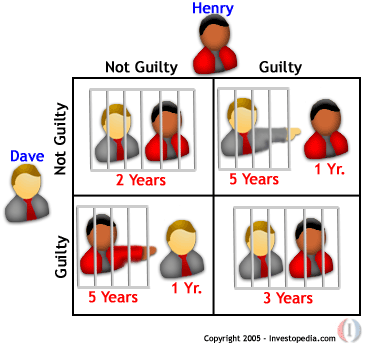Prisoner's Dilemma
A paradox in decision analysis in which two individuals acting in their own best interest pursue a course of action that does not result in the ideal outcome. The typical prisoner’s dilemma is set up in such a way that both parties choose to protect themselves at the expense of the other participant. As a result of following a purely logical thought process to help oneself, both participants find themselves in a worse state than if they had cooperated with each other in the decision-making process.
Suppose two friends, Dave and Henry, are suspected of committing a crime and are being interrogated in separate rooms. Both individuals want to minimize their jail sentence. Both of them face the same scenario:

Dave has the option of pleading guilty or not guilty. If he pleads not guilty, Henry can plead not guilty and get a two-year sentence, or he can plead guilty and get a one-year sentence. It is in Henry’s best interest to plead guilty if Dave pleads not guilty. If Dave pleads guilty, Henry can plead not guilty and receive a five-year sentence. Otherwise he can plead guilty and get a three-year sentence. It is in Henry’s best interest to plead guilty if Dave pleads guilty.
Suppose two friends, Dave and Henry, are suspected of committing a crime and are being interrogated in separate rooms. Both individuals want to minimize their jail sentence. Both of them face the same scenario:

Dave has the option of pleading guilty or not guilty. If he pleads not guilty, Henry can plead not guilty and get a two-year sentence, or he can plead guilty and get a one-year sentence. It is in Henry’s best interest to plead guilty if Dave pleads not guilty. If Dave pleads guilty, Henry can plead not guilty and receive a five-year sentence. Otherwise he can plead guilty and get a three-year sentence. It is in Henry’s best interest to plead guilty if Dave pleads guilty.
Dave faces the same decision matrix and follows the same logic as Henry. As a result, both parties plead guilty and spend three years in jail although through cooperation they could have served only two.
A true prisoner’s dilemma is typically "played" only once; otherwise it is classified as an iterated prisoner’s dilemma.
附件列表
词条内容仅供参考,如果您需要解决具体问题
(尤其在法律、医学等领域),建议您咨询相关领域专业人士。
如果您认为本词条还有待完善,请 编辑
上一篇 Price Transparency 下一篇 Problem Child
